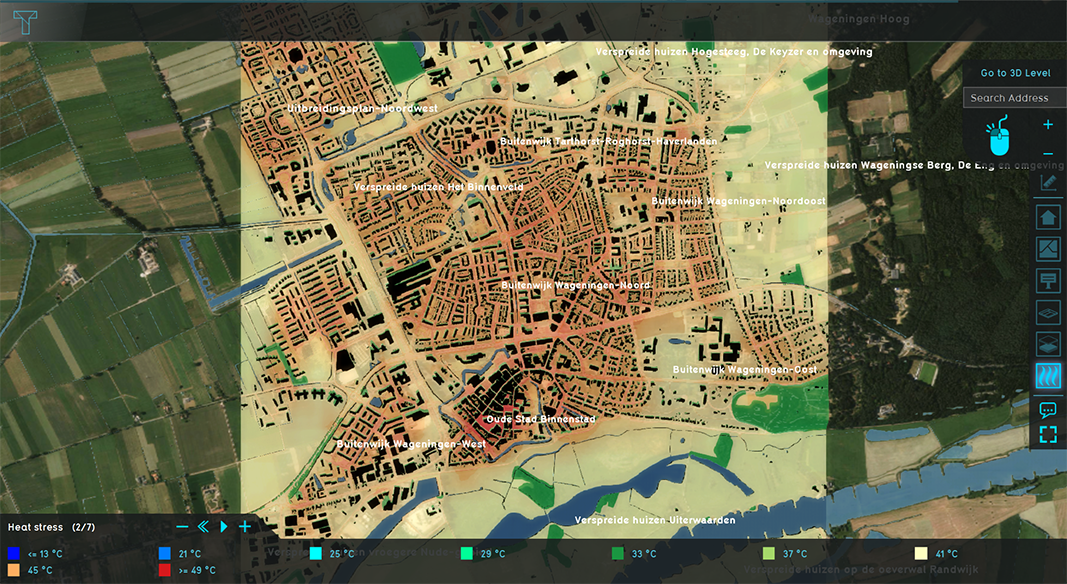DPRA Heat Module: Difference between revisions
(Created page with "We are working on a new heat module in accordance . This module is still under construction, as is the documentation, however a Beta version of the module is available on the...") |
No edit summary |
||
| (65 intermediate revisions by 4 users not shown) | |||
| Line 1: | Line 1: | ||
[[File:DPRA_Heatstress_overlay.PNG|thumb|420px|right|Example of the DPRA Heat Stress overlay showing the [[Pet result type (Heat Overlay)|Physiological Equivalent Temperature result type]].]]__NOTOC__ | |||
The Heat DPRA module is a new (as of 2019) Heat Stress Module, developed to be in accordance with the 2019 {{Template:Heat DPRA Report}}. With this module, stress tests can be performed according to the Dutch [https://www.deltaprogramma.nl Deltaprogramma] guidelines. | |||
Heat is | The Heat DPRA Module gives insight in the physiological equivalent temperature (PET), which is a form of perceived temperature, and in how it can be influenced. The PET is determined using different elements, which can be analyzed individually. As a result, the Heat DPRA Module also offers tools for shade and sun angle analyses. | ||
A clip showcasing an overview of the module's functionalities can be found [https://www.youtube.com/watch?v=_DrkBfKKDEI&list=PLqkv7u9AhhfyOaMEVMq1LHOaaPyMyzUEC here]. | |||
https://www. | |||
==Configuration== | ==Configuration== | ||
For the model attributes, see [[ | The DPRA Heat module is the default module for the [[Heat stress Overlay]]. When a Heat stress Overlay is added, it can immediately be configured using the [[Heat Overlay Wizard (Heat Overlay)|Heat Overlay configuration wizard]]. | ||
For more information on the configurable model attributes, see [[Model attributes (Heat Overlay)|Heat Overlay model attributes]] and [[Feature attributes (Heat Overlay)|Heat Overlay feature attributes]]. | |||
==Available Result Types== | |||
The Heat Overlay allows user to visualize a generated Physiological Equivalent Temperature (PET) overlay, along with other intermediate overlay results. The Heat Overlay wizard allows users to select which results should be generated. For further information on the available results, see [[Result types (Heat Overlay)|Heat Overlay result types]]. | |||
==Theory== | |||
The [[Calculation models and formulas (Heat Overlay)|calculation models and formulas]] are documented. The DPRA Heat Module is [[Heat module benchmarks|benchmarked]] using the {{Template:Heat DPRA Report}}. The benchmark case is situated in Wageningen, Netherlands, on 02-08-2013. It is deemed relevant to the report because it can be related to actual measurements made for the city of Wageningen. | |||
==See also== | |||
* For the previously default Heat Overlay configuration, see [[UNESCO Heat Module]]. | |||
{{Template:Heat_Module_buttons}} | |||
Latest revision as of 15:03, 30 June 2023

The Heat DPRA module is a new (as of 2019) Heat Stress Module, developed to be in accordance with the 2019 DPRA Heat stress report. With this module, stress tests can be performed according to the Dutch Deltaprogramma guidelines.
The Heat DPRA Module gives insight in the physiological equivalent temperature (PET), which is a form of perceived temperature, and in how it can be influenced. The PET is determined using different elements, which can be analyzed individually. As a result, the Heat DPRA Module also offers tools for shade and sun angle analyses.
A clip showcasing an overview of the module's functionalities can be found here.
Configuration
The DPRA Heat module is the default module for the Heat stress Overlay. When a Heat stress Overlay is added, it can immediately be configured using the Heat Overlay configuration wizard.
For more information on the configurable model attributes, see Heat Overlay model attributes and Heat Overlay feature attributes.
Available Result Types
The Heat Overlay allows user to visualize a generated Physiological Equivalent Temperature (PET) overlay, along with other intermediate overlay results. The Heat Overlay wizard allows users to select which results should be generated. For further information on the available results, see Heat Overlay result types.
Theory
The calculation models and formulas are documented. The DPRA Heat Module is benchmarked using the DPRA Heat stress report. The benchmark case is situated in Wageningen, Netherlands, on 02-08-2013. It is deemed relevant to the report because it can be related to actual measurements made for the city of Wageningen.
See also
- For the previously default Heat Overlay configuration, see UNESCO Heat Module.




